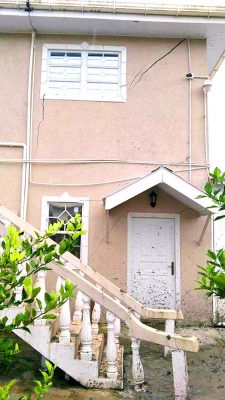Diamond home owner Gail Williams, whose property suffered structural damage when an illegally dug water well erupted last June, is suing the man who dug the well—Soownauth Gorakh, for damages in excess of $1M for negligence and nuisance, arguing that he permitted the eruption of mud, water, noxious gases and effluent from his property, onto hers.
Williams currently has a suit against her insurance company—Guyana and Trinidad Mutual Fire Insurance Company Limited (GTM), which she says is refusing to cover the damage under her $35.8M policy.
The well was reportedly dug by Gorakh for domestic purposes, in the yard of his Sixth Street, Diamond Housing Scheme home. He had claimed via a statement issued by the Region Four administration that he and his wife had attempted to dig the well after experiencing water woes.
Following her suit against him, Williams, (the claimant) deposed in court documents of learning that the man was planning to sell his property and expressed fear that if he does, she would likely end up with an “empty judgment” should she succeed in her claim.

Against this background, she was able through her attorney Eusi Anderson, to secure an injunction against Gorakh, who has given the court an undertaking that he will not sell his property, while the full hearing and determination of Williams’ claim is still pending.
The injunction specifically prohibits “the defendant and or his agents, servants, attorneys from alienating, selling, mortgaging, encumbering, or in any way parting with his share and interest” in a lot 1601 Section ‘B’ Block X Diamond, East Bank Demerara property which he owns.
In addition to the $1M for which she is suing Gorakh, (the defendant) Williams is also seeking interest, costs and any further order which the court may deem just to grant.
In her statement of claim, she said that her Lot 1199 Section ‘A’ Diamond property, which has been rendered uninhabitable because of the repeated explosions from the well, is located immediately east of the defendant’s Lot 1200 property.
According to her, there he operated several small businesses including a water treatment processing plant. She said he had also been involved in the marketing, sale and processing of potable water there.
As Williams had explained in the suit against her insurance company, she outlined that in Gorakh’s attempt to dig the approximately 150-ft well, at a depth of about 130-ft he encountered a gas pocket of methane and other gases, which caused an explosion.
As a result, she said that flammable and dangerous gases filled the air at her property as did mud and water, while noting that the latter two elements erupted hundreds of feet into the air, causing damage to her building, yard, fence and the general environs of her property, and resulting in her foundation being structurally compromised.
She added that her property has since been left with wide 2 to 4-inch cracks. Williams said that her house has “been badly damaged to the extent that it is unfit for human habitation.” As a result, she said she has since had to resort to renting.
The woman said that mud, water, noxious gases and effluent from the explosion which escaped from Gorakh’s property, onto hers, destroyed not only her building, but things inside her house as well.
Contending that the digging was negligently initiated by the defendant, Williams is of the view that he ought to be held strictly liable for the escape and ensuing consequences which has caused her losses.
She said that her neighbour’s negligence includes among other things; failure to equip himself and or his agents with the necessary skill, experience and expertise in the drilling of wells; or that he failed to find suitably qualified professional substitutes.
She said he also failed to follow safe or proper procedures for the drilling of wells and to obtain the needed permit from government agencies for approval of well drilling.
The claimant is contending too, that Gorakh failed to have necessary contingency/emergency plans, equipment and personnel in place to cater for any and all foreseeable emergencies and or explosions, connected to the drilling of wells.
Pegging the value of her property at $120,000,000; Williams said that several contractors and engineers have estimated the cost of repairs to be in the region of $75,000,000 to $100,000,000.
Noting that the property at Lot 1200 at which the well erupted has itself been left in an advanced state of destruction and is now of scant economic value, she indicated that the Lot 1606 property could be worth in excess of $15M and which can at least satisfy a potential judgment in her favour.
Williams said that having lived next to Gorakh for a number of years, he is, from her observation, self-employed, which excludes garnishing from a salary as an option available to a successful claim.
Since the explosion, Williams said that the defendant has removed from the lot 1200 property which has permanently become the site of several government agencies that seem to have annexed it.
With the unlikelihood of it being of any substantial value or attractive to any prospective buyer on the open market, Williams said that that property would be incapable of fulfilling any judgment in her favour.
The 1606 property she said, however, is where Gorakh now resides and hides himself away from her many attempts to engage him in possible non-judicial dialogue for possible resolution of the claim.
This property she said, is in excellent condition and the only property at the Deeds Registry she could find belonging to the Gorakh, though he owns it jointly with his wife.
Williams said that she has learnt, however, that the half share belonging to the defendant could be worth in excess of $15M should it become necessary to sell, while adding that from all indications and searches of public records, it appears this is the only property unencumbered and belonging to Gorakh, from which a potential judgment could be satisfied.






